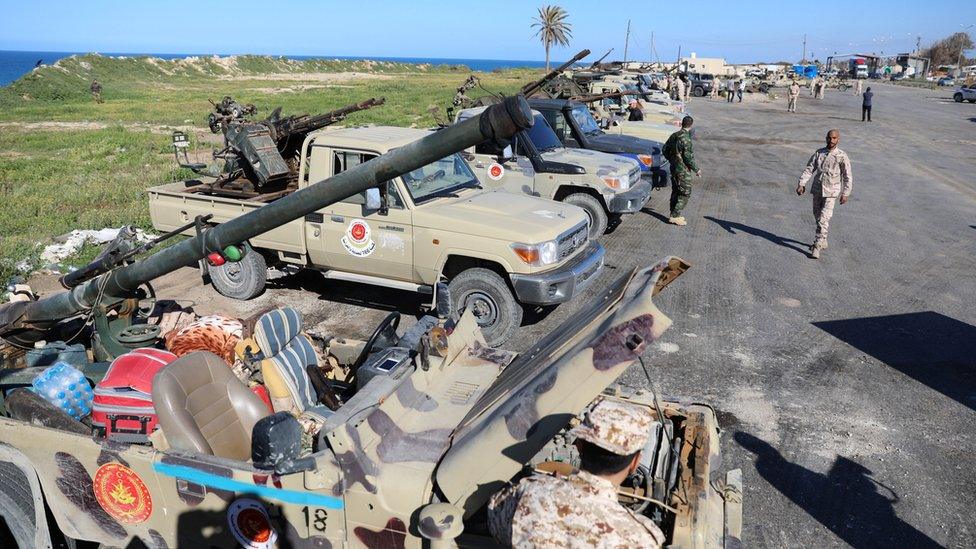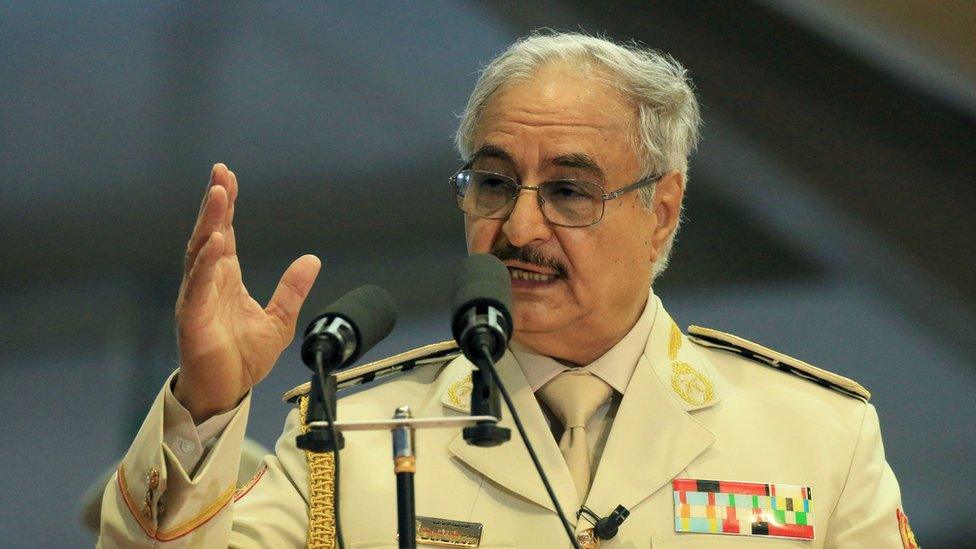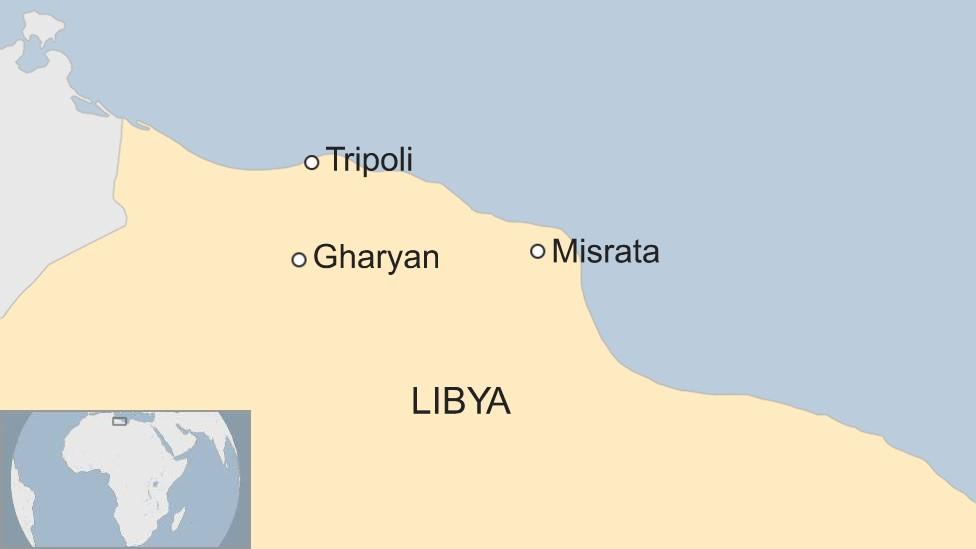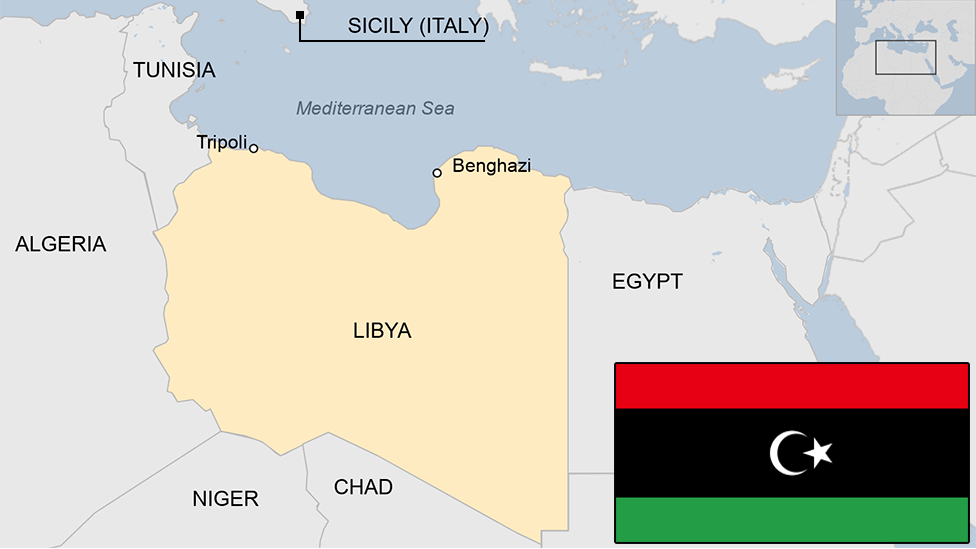Libya crisis: Prime Minister Fayez al-Serraj vows to defend Tripoli
- Published

Pro-government militias from the city of Misrata have reportedly been moving to defend Tripoli
Libya's UN-backed prime minister has vowed to defend the capital Tripoli as forces loyal to a rival advance from the east.
In a televised address, Fayez al-Serraj accused Gen Khalifa Haftar of launching a coup, saying his troops would be met with force.
Gen Haftar's troops are on the outskirts of the city and say they have seized Tripoli's international airport.
Tripoli is the base of the UN-backed, internationally recognised government.
Libya has been torn by violence and political instability since long-time ruler Muammar Gaddafi was deposed and killed in 2011.
What has Mr Serraj said?
In his address on TV, he warned of a "war without a winner".
He said: "We have extended our hands towards peace but after the aggression that has taken place on the part of forces belonging to Haftar, he will find nothing but strength and firmness."
Mr Serraj said he had offered concessions to Gen Haftar to avoid bloodshed, only to be "stabbed in the back".
What's happening on the ground?
Gen Haftar ordered his forces to advance on Tripoli on Thursday.
His Libyan National Army (LNA) forces have been carrying out a multi-pronged attack from the south and west of the city.
However, forces loyal to Mr Serraj's Government of National Accord (GNA) have now slowed the advance.
"Intensive air strikes" were carried out by GNA aircraft 50km (30 miles) south of Tripoli on Saturday.
One militia from Misrata told AFP it had aligned with the GNA and had sent armed vehicles to Tajura, in the eastern suburbs, to counter the LNA.
The LNA said it had seized the disused international airport south of the capital.
US Africa Command, responsible for US military operations and liaison in Africa, external, said that due to the "increased unrest" it had relocated an unspecified contingent of US forces, but gave no further details.
Tripoli residents have begun stocking up on food and fuel.
Who are the opposing forces?
Libya has been wracked by unrest since the overthrow of Col Gaddafi. Dozens of militias operate in the country.

Gen Haftar has ordered his forces to advance on Tripoli
Recently they have been allying either with the UN-backed GNA, based in Tripoli, or the LNA of Gen Haftar, a tough anti-Islamist who has the support of Egypt and the UAE and is strong in eastern Libya.
Gen Haftar helped Col Gaddafi seize power in 1969 before falling out with him and going into exile in the US. He returned in 2011 after the uprising against Gaddafi began and became a rebel commander.
The unity government was created at talks in 2015 but has struggled to assert national control.

Back to square one?
Analysis by Rana Jawad, BBC North Africa correspondent, in Tunis
The rogue general's defiance suggests that, despite international condemnation of his recent moves, he believes he can only secure a place in Libya's future political makeup through militarily means.
Diplomats are worried, because the manner and timing of the attack means he is unlikely to back down unless he is defeated.
Few thought he would go ahead and launch this operation - which he has long threatened to do - because they believed ongoing talks that saw him go from Paris to Palermo and the UAE for more than a year would buy time until a new political settlement was reached through negotiations and an eventual electoral process.
Today, Western nations have few cards to play to de-escalate the violence and once again find themselves in a position where they may need to start from scratch.

Are peace talks planned?
UN-backed talks aimed at drawing up a road map for new elections have been scheduled for 14-16 April in the Libyan city of Ghadames.
UN envoy Ghassan Salame insisted the talks would go ahead, unless serious obstacles prevented it, saying "we won't give up this political work quickly".
UN Secretary General Antonio Guterres was in Tripoli just last Thursday to discuss the situation.
But Gen Haftar has said his troops will not stop until they have defeated "terrorism".
The G7 group of major industrial nations has urged all parties "to immediately halt all military activity" and Russia has also called on parties to find an agreement.

- Published13 September 2023
